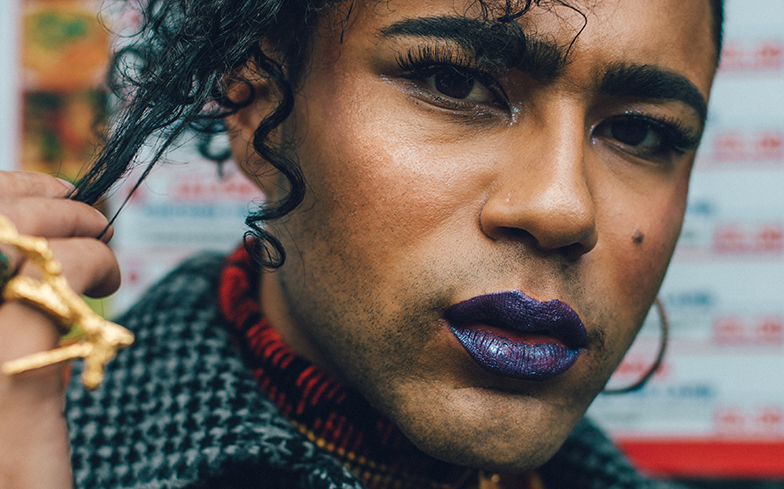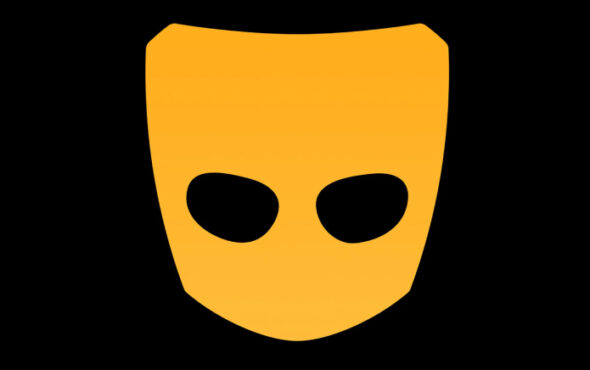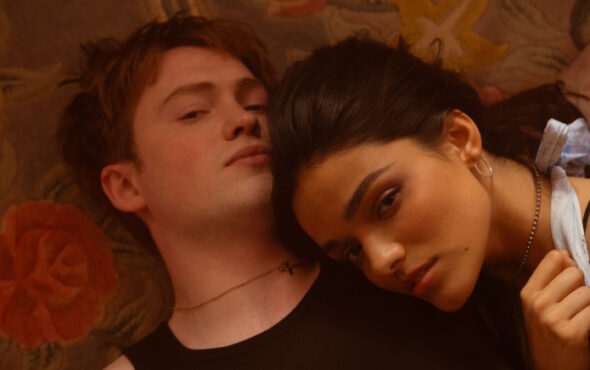
Travis Alabanza is a powerhouse of raw talent and conviction.
Over the past few years, they’ve quickly emerged as one of the most impressive queer voices not only here in the UK, but on an international scale. Their unique combination of performance, fashion, poetry and critical thought has brought awareness to the trans experience in a new, accessible way – all whilst maintaining that the trans experience is absolutely not up for debate, a difficult feat in the world of public transphobia that they navigate each day.
Ahead of the premiere of their highly-anticipated show Burgerz, which opens for previews at Hackney Showroom on 18 October, we caught up with Travis on their work, safe spaces, bringing a sense of urgency to the trans conversation, reimagining Prides of the future and why trans issues affect us all.
Pride season is coming to an end, but what does Pride mean to you?
I think it depends who I’m hearing the words come from. I think now it means that when I see it I kind of cringe because it’s become something so commercial and capitalised – all these things that don’t often reflect me. But I think down at its core, to me Pride when it’s its most powerful just means you and your friends going down the street just fucking shit up and not caring.
So would you say that your perception of Pride has changed over time?
Yeah I think so – once I became more aware of different cities’ Prides and how Pride works it changed because it became to me a lot more associated to these mainstream corporate Prides that don’t always fit for people like me. But then I think it’s important to hold Pride close to me because it’s about shifting what it means and creating your own definition.
Do you find it shocking that many people don’t realise how it started?
Yeah it’s so funny, and it’s so frustrating because now I think people are starting to realise. but they’ll pay it as a lip service and say it in this one phrase as if that’s not to suggest that we’re literally here celebrating and starting things because of [trans people of colour] and I think it demonstrates just how much trans people of colour do for the community all year round. When we think about nightlife, when we think about language, when we think about words that we use, meme culture and all the things on the internet. Lots of quote-unquote gay culture is actually trans culture, and lots of queer culture is coming from trans feminine people of colour, gender non-conforming black girls, and trans women of colour. So much of that comes from us so I think Pride is a good remembrance of what we owe members of our community.
Totally. A lot of people think of it as an excuse to have a party, without acknowledging all the work that is still to be done for other areas of the community.
I think we all need to party, right? I feel like as oppressed people and communities we deserve to have spaces of joy and we deserve to have spaces to relax. I think it’s really interesting because at Pride, the people that find it hardest to relax at other times of the year have a space where they can relax to the fullest. I question whether these cis gay white men that are like your ‘Clapham Accountant Gays’ are really finding it that hard to relax and assimilate into places the other days of the year. I would rather imagine a Pride where lots of trans, gender non conforming people of colour could take to the streets and party safely – that’s the kind of party I’m interested in. I think a lot of the time, people throw a lot of critiques within the community to activists or quote-unquote woke Twitter that they’re party poopers, but for me it’s about realising that parties can be political and they aren’t about erasing people’s history.

Iolo Louis Edwards for Gay Times
How do you toe the line between raising awareness on the problems that the trans community face whilst also making it clear that the trans experience isn’t up for debate?
I feel like obviously we saw on [Channel 4’s] Genderquake a prime example of when trans people are offered visibility but not safety. They’re offered an opportunity but not really a valid opportunity, rather one that’s just them being thrown into a lion’s pit really. And I think for me it’s about who’s leading these conversations – who are the people behind the scenes putting trans people in these situations and what have the conversations been like? Has the trans person’s autonomy and choice been considered throughout? I think we’re balancing a really, really dangerous line at the moment of hypervisibility and actual liberation and I think it will only come when we see these companies, these places that are using trans as a tipping word, to actually follow through. So I’m looking forward to Channel 4 deciding to put out a program to hire new trans directors, or look and see if they want to have trans people working behind the scenes at their shows. I seriously doubt this will happen but that’s the kind of work we need to see. We need to see people caring about trans economy – trans unemployment rates are so high and we can’t just put them on magazines, we have to be thinking about trans people as the most oppressed in our society. Also, sidenote: Genderquake was such a shitshow. I’m so glad I said no to that.
So they asked you to appear on the show?
Yeah, we were going back and forth for a few weeks, and they promised me all these things and something in the back of my head was like ‘do you know what, this doesn’t seem right’. At this time they hadn’t said that anyone else was on and when I asked who else was going to be on, they said ‘no don’t worry’, and then Ash who was on the show called me and said that they’d found out that Germaine Greer was going to be on. So I called Channel 4 like ‘what the fuck?’ There was just so much dishonesty from the get go.
Many people in an effort of being inclusive simply encourage trans people to just ‘live their truth’ without being aware of the very real dangers that trans people face. Your work can be quite confronting, are you doing this intentionally in order to raise awareness of this?
Confronting is a word that I get a lot and I think it’s because often when we see trans people in the public eye and in public image, because of trans misogyny and because of transphobia, we expect these people to be nice – like in order for trans people to get liberation they have to smile, nod and be polite. But the violence that we’re experiencing isn’t polite, the violence is urgent and I want to push the conversation further. I don’t think it’s enough to just say ‘trans women are women’ and ‘trans men are men’. We’re fighting to exist and getting our pronouns right is still valid, but I’m pushing more by saying: what does it actually mean to think of a world where we’re reducing the ways in which gender can inflict upon us? What does it mean to actually love trans people? Actually desire us and actually care about us? That goes beyond just saying that we exist. I think it’s really important and I want to push the conversation forward. I’m bored of people starting and stopping our conversation on pronouns – there’s so much more to talk about in trans politics and it kind of goes beyond that for me. I say a lot in my work that what we’re not getting in the current trans conversation is that trans politics helps all of us. It is actually a feminist issue in the sense that it frees women and men from gender constriction. I think a lot of us ignore, with trans politics especially, that non-binary politics help cisgender men and women free themselves from gender conforms too. So I think that’s where I’m trying to confront people. I’m saying that this is your problem as well as mine
So how do we as a society need to shift to view people beyond the pronoun, while also respecting the context that’s associated with the label?
I think it’s going to have to start at a more urgent pace. It’s going to have to start with us realising that we all have a stake in each other’s lives and that this isn’t just to do with trans rights. It’s about going beyond and learning, listening, reading but also deciding that you don’t need to know a trans person to want them to be free. Like, I shouldn’t have to know you to want you to be free. Once we start there and imagining what freedom can look like for trans people, I think we can shape things better.

Iolo Louis Edwards for Gay Times
What kind of reactions do you receive from your run of the mill cisgender white person?
Oh my God, it’s so varied. It’s different. I did a US tour of five weeks across the States to like 22 different shows and the majority of my audiences were white cisgender people. I did a gig in Miami…
As in Florida?
I thought it was going to be Florida too, but it turned out to be Miami, Ohio. It was in the absolute middle of nowhere – yeah it was kind of wild. Anyway, I was really worried. I was like, shit here we go here’s what I’m about to do. And what I was realising with this work is that you know sometimes I’m met with anger, sometimes I’m met with confusion, but that’s okay. I think art has a real power to build a real empathy between us and to say: ‘Oh no I thought I had all these ideas from the media and from the press about trans people, and here I am seeing one just talk and bring their work to the stage’, and more and more I’m seeing this joint empathy. What I’m seeing at the moment is that my work is starting at trans and then going beyond and saying that these are things we’re all experiencing. We all feel scared, we all feel lonely, we all feel sad and drawing on those human things brings us together. I hope that my work tries to create an urgency after they see the shows. But of course it varies, I’ve had people walk out but I think I wouldn’t be doing something right if someone didn’t walk out.
A lot of your work covers being at the intersection of both being black and being trans – how do you find that those two experiences compound upon you as you navigate the world?
I think for me it’s about saying that first we existed. I think so much of the racialised trans experience is like you didn’t know that you were real. At the moment it’s different, at the moment there is a bit more visible trans POC representation. I mean, it’s still failing in different aspects but when I started making work it was really like, ‘damn where are the performers of colour out here?’ Like when I first came onto the cabaret scene before all of these initiatives, there really wasn’t a space speaking about these things and my work was about saying like: We exist. For example, what you notice in the Genderquake debate – sorry to bring it back to that – is that the type of violence that Munroe [Bergdorf] was receiving versus what Caitlyn Jenner was receiving was different. The type of language and the type of aggression was different and it’s all about blackness. The way that we gender black people is different, right? I talk about this in my shows a lot – it’s like black men being hyper sexualised, black women being hyper sexualised – we’re already being gendered in a specific way, so when you see a trans person they’re already seeing my body in a different way when I walk down the street. For me transness can’t be seperate from colonisation. What I mean by that is that the ways in which I’m seen on the street. Black bodies are often compared to animals and likened to non-human things, whereas whiteness is always seen as the opposite: it’s completely human, it’s innocent. So although transness disrupts this, it goes even further when you’re both trans and black. The proximity to being beat black is more. Our community has such a lack of resources – we are very resourceful – but we have a lack of resources given to us, and often our race is mixed in with poverty and mixed in with transness and it creates a different experience.

Iolo Louis Edwards for Gay Times
How does it feel to be considered a role model?
You know what it’s a really interesting thing for me when I get messages from people saying that my work has meant something to them, but I like to think that I’m just saying something and maybe it’s being read by more people, or it’s a bit louder at the moment. I think ‘role model’ scares me because I’m messy, I’m imperfect and I’ve made mistakes before and I’ll make mistakes again. But as someone who’s speaking loudly in this moment, yeah I think I see myself as someone who’s doing that but obviously there’s loads of other people too. I see it as a moment really. I see myself less as an individual person and more as a part of a collective moment of trans people making incredible work and doing incredible things on the front lines. In the UK especially, we’re seeing a huge rise of these amazing writers and speakers. Obviously Munroe being completely visible on the forefront, but also people like Kuchenga and Juno Ross and other aspects of life like Juno Dawson having an incredible sellout novel. We’re seeing lots of UK trans people take to the forefront which is really exciting.
What can the gay community do to better serve the trans community?
Obviously I grew up in the gay community – that’s where I found my transness. What I’d love to see more is cis gay people recognising how much they got from us, how much we’re keeping their culture alive. How there’s a lot of stuff that they’re celebrating that is indebted to trans people. And to not just care about our ability to death drop, but also care about our ability to drop dead. And I mean by that not just care about us in our fierceness and our slayness and our ability to finger snap and bring the party, but also care about how we’re getting home from the party. I think that for me is the focal point: to see us outside of just being fierce people and to see us also as just people.
We’ve been looking forward to Burgerz for a while now, can you tell us a bit about it?
Burgerz for me is my chance to make a theatre show, a full body of work, a statement that goes beyond online, the energy around me, the conceptions people may have and into something deeper. It’s my chance to speak, have the stage, take risks and go beyond trans and into something far more nuanced. I am ready for this piece of work to have an audience see me as an artist, with craft and intention, beyond just my identities. It feels like a really important moment for me.
Tickets for Burgerz are available to purchase from Hackney Showroom.
Photographer Iolo Louis Edwards
Stylist Paul Scott-Coombs
Grooming Shamirah Sairally
Assistant Shakirra Mae



